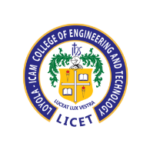Artificial Intelligence and Data science
Outcome Based Education
Program Education Objectives

- Graduates will have successful careers and demonstrate technical competence in artificial intelligence and data science, contributing effectively to their respective fields
- Graduates will engage in lifelong learning and professional development, staying current with emerging technologies and evolving industry standards
- Graduates will develop strong leadership and collaboration skills, prioritizing ethical values and addressing societal needs through responsible and impactful AI and data science practices
PROGRAM SPECIFIC OUTCOMES
Engineering graduates will be able to
PSO 1 – Apply mathematical, statistical analysis and engineering concepts to conduct comprehensive data analysis, enabling informed decision making and optimizing the training and refining of AI models
PSO 2 – Implement algorithms and concepts to develop and enhance AI models, addressing the real-world challenges across different fields and create solutions through innovative approaches
PSO 3 – Strengthen foundational computing skills and knowledge to ensure comprehensive technical proficiency and support advanced capabilities in AI and Data Science
PROGRAM OUTCOMES
PO 1 – Engineering knowledge: Apply the knowledge of mathematics, science, engineering fundamentals, and an engineering specialisation for the solution of complex engineering problems.
PO 2 – Problem analysis: Identify, formulate, research literature, and analyse complex engineering problems reaching substantiated conclusions using first principles of mathematics, natural sciences, and engineering sciences.
PO 3 – Design/Development of Solutions: Design solutions for complex engineering problems and design system components or processes that meet the specified needs with appropriate consideration for public health and safety, and cultural, societal, and environmental considerations
PO 4 – Conduct investigations of complex problems: Use research-based knowledge and research methods including design of experiments, analysis and interpretation of data, and synthesis of the information to provide valid conclusions.
PO 5 – Modern tool usage: Create, select, and apply appropriate techniques, resources, and modern engineering and IT tools including prediction and modelling to complex engineering activities with an understanding of the limitations.
PO 6 – The engineer and society: Apply reasoning informed by the contextual knowledge to assess societal, health, safety, legal, and cultural issues and the consequent responsibilities relevant to the professional engineering practice.
PO 7 – Environment and sustainability: Understand the impact of the professional engineering solutions in societal and environmental contexts, and demonstrate the knowledge of, and the need for sustainable development.
PO 8 – Ethics: Apply ethical principles and commit to professional ethics and responsibilities and norms of the engineering practice
PO 9 – Individual and team work: Function effectively as an individual, and as a member or leader in diverse teams, and in
PO 10 – Communication: Communicate effectively on complex engineering activities with the engineering community and with the society at large, such as being able to comprehend and write effective reports and design documentation, make effective presentations, and give and receive clear instructions
PO 11 – Project management and finance: Demonstrate knowledge and understanding of the engineering and management principles and apply these to one’s work, as a member and leader in a team, to manage projects and in multidisciplinary environments.
PO 12 – Life-long learning: Recognise the need for, and have the preparation and ability to engage in independent and life-long learning in the broadest context of technological change.




